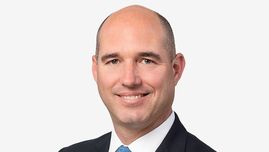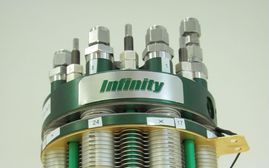
Processing Your Payment
Please do not leave this page until complete. This can take a few moments.
- News
-
Editions
View Digital Editions
Biweekly Issues
- May 13, 2024
- April 29, 2024
- April 15, 2024
- April 1, 2024
- March 18, 2024
- March 4, 2024
- February 19, 2024
- February 5, 2024
- January 22, 2024
- + More
Special Editions
- Lists
- Viewpoints
- HBJ Events
- Business Calendar
- Custom Content
Raytheon CEO: Company could shrink office space by 25%; hybrid work environment way of the future
 Contributed
Gregory Hayes,
Contributed
Gregory Hayes,
Raytheon Technologies CEO Gregory J. Hayes said he can see eliminating up to 25% of the conglomerate’s 32 million square feet of office space due to changes in work habits brought on by the COVID-19 pandemic.
“The office has changed,” Hayes said Wednesday during a live-streamed virtual interview with Carlyle Group co-founder David Rubenstein for The Economic Club of Washington, D.C.
Noting that he hasn’t had an in-person board meeting or staff meeting since the former United Technologies Corp. and Raytheon Co. merged to form Raytheon Technologies one year ago, Hayes said telecommuting will be the way of the future.
“We have 32 million square feet of office space out there,” he said. “I think we’ll eliminate 25% of that in the next couple of years and people will have a hybrid working environment. They’ll be in the office a day or two a week, then they’ll be working remotely.”
In contrast to numerous other Fortune 500 CEOs — who have been eager to lure vaccinated employees back to the office with new safety protocols and enhanced support services — Hayes said the work-from-home model, while “not perfect,” has undeniable benefits.
“The efficiency of [remote work] is phenomenal,” he said. “No commute, just the ability to focus on work and get things done. Most people I think enjoy the remote work-life balance.”
Hayes did not say where or in what market the company would eventually seek to scale back its commercial footprint, but it occupies plenty of office space in Connecticut, particularly in Farmington where it was previously headquartered.
Raytheon owns nearly 300,000 square feet of office space in that town in three buildings at 1 Carrier Place, 1 Farms Spring Road, 4 Farm Springs Road, town records show.

Meantime, its jet-engine making subsidiary Pratt & Whitney is headquartered in East Hartford. Reductions at any of those locations would most likely result in reduced economic activity for surrounding communities and a loss of property taxes paid to municipal governments.
When asked about the company’s long-term prospects, Hayes said several factors, including an expected rebound in commercial air travel and a $70 billion backlog of defense projects, make him optimistic.
“We’ve got a good hand here for the recovery that’s coming,” he said.
Related Content

2022 Giving Guide
This special edition informs and connects businesses with nonprofit organizations that are aligned with what they care about. Each nonprofit profile provides a crisp snapshot of the organization’s mission, goals, area of service, giving and volunteer opportunities and board leadership.
Learn more
Subscribe
Hartford Business Journal provides the top coverage of news, trends, data, politics and personalities of the area’s business community. Get the news and information you need from the award-winning writers at HBJ. Don’t miss out - subscribe today.
Subscribe
2024 Book of Lists
Delivering Vital Marketplace Content and Context to Senior Decision Makers Throughout Greater Hartford and the State ... All Year Long!
Read Here-
2022 Giving Guide
This special edition informs and connects businesses with nonprofit organizations that are aligned with what they care about. Each nonprofit profile provides a crisp snapshot of the organization’s mission, goals, area of service, giving and volunteer opportunities and board leadership.
-
Subscribe
Hartford Business Journal provides the top coverage of news, trends, data, politics and personalities of the area’s business community. Get the news and information you need from the award-winning writers at HBJ. Don’t miss out - subscribe today.
-
2024 Book of Lists
Delivering Vital Marketplace Content and Context to Senior Decision Makers Throughout Greater Hartford and the State ... All Year Long!
ABOUT
ADVERTISE
NEW ENGLAND BUSINESS MEDIA SITES
No articles left
Get access now
In order to use this feature, we need some information from you. You can also login or register for a free account.
By clicking submit you are agreeing to our cookie usage and Privacy Policy
Already have an account? Login
Already have an account? Login
Want to create an account? Register
Get access now
In order to use this feature, we need some information from you. You can also login or register for a free account.
By clicking submit you are agreeing to our cookie usage and Privacy Policy
Already have an account? Login
Already have an account? Login
Want to create an account? Register









0 Comments